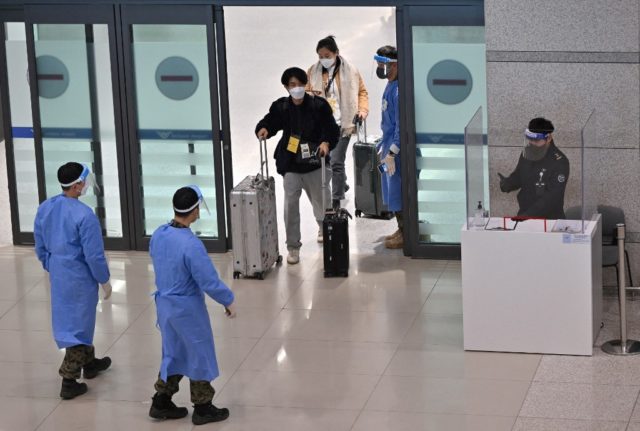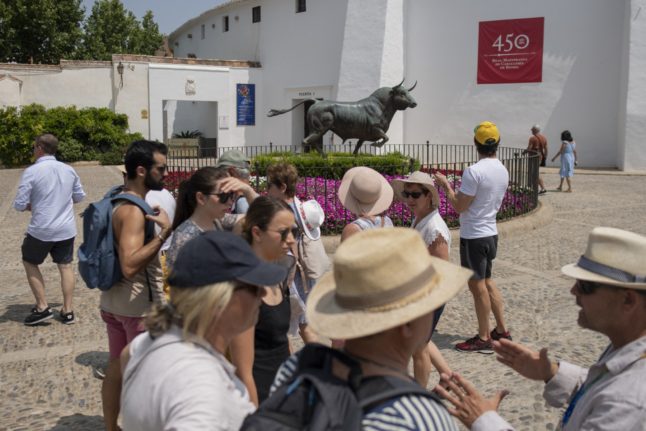Spain has beefed up its border rules to combat the ongoing Covid-19 outbreak in China this week.
After initially saying it wouldn’t require a negative test, then quickly backtracking on that pledge and introducing visual and temperature checks on December 31st, then a negative test, it has now been confirmed that Covid-19 certificates will be required for all arrivals from the Chinese mainland and that Spanish border guards will have the right to deny entry to third-party nationals without one.
READ ALSO: UPDATE: How Spain is reacting to China’s Covid-19 spike
Since China dropped its strict zero-Covid policy three weeks ago after almost three years in place, the number of infections in the Asian superpower has spiked, with experts in the UK estimating 9,000 deaths per day as of December 30th.
The Chinese government has since allowed Chinese nationals to travel overseas, and countries around the world are concerned about the prospect of a new variant spreading and reigniting a pandemic many epidemiologists considered to be over.
According to the official state bulletin (BOE) released by the government on Wednesday, the measures are being introduced due to “a significant deterioration in the epidemiological situation regarding COVID-19 in the People’s Republic of China that coincides with the elimination of travel restrictions in this country [China], as of January 8th, 2023, and the celebration of its new year, on January 22nd.”
The period around Chinese New Year is a traditionally travel-intensive time.
“This scenario constitutes a serious epidemiological risk that makes it advisable to be extremely vigilant and to adopt preventive measures to avoid, in particular, the potential spread of possible new variants,” the BOE adds.
Given these recent developments, the Spanish Ministry of Health has decided to adopt urgent measures to keep on top of the situation.
Covid certificate checks
In a resolution established on December 30th, 2022, sanitary controls were established at the border for passengers arriving from China, consisting of “documentary, visual and temperature controls and the performance of a diagnostic test for active infections at the point of entry.”
Now, in addition, Covid certificates will be checked for “any third-country national arriving at any airport located in the Kingdom of Spain on direct flights from airports located in China,” according to the BOE.
Certificates will first be checked at the point of origin, that is, in China, and then again at the Spanish border by health workers. Certificates must include the complete EU vaccination series, or a recognised equivalent, or the negative result of a recently taken test.
Third-country nationals without either will be refused entry into Spain, with a few exceptions.
Exceptions
According to the BOE, “people belonging to one of the following categories will be exempted from the refusal of entry measure.”
- Residents of the European Union; Schengen associated states; Andorra, Monaco, the Vatican, or San Marino who are en route to that country, with documentary proof.
- Holders of a long-stay visa issued by a EU member state or a Schengen associated state travelling to that country.
- Crews of national and international transport teams.
- Travellers with documentary proof of force majeure or distress, or whose entry is permitted on other humanitarian grounds.
- Minors under 12 years of age.
Vaccines
In terms of which vaccination certificates will be accepted, Spain is following the guidelines established in its broader pre-exisiting vaccination strategy, so: AstraZeneca/Oxford, SanofiGSK, Johnson & Johnson/Janssen, Pfizer/BioNTech, CureVac and Moderna/Lonza.
Tests
In the case of a diagnostic test certificates, the tests must be (NAAT), including PCR, whose sample has been obtained within 72 hours prior to departure, or antigen tests approved by the EU and obtained within 24 hours prior to departure.
Recovery certificates
In terms of recovery certificates, Spain’s pre-existing guidelines are also being followed. A recognised certificate issued at least 11 days after the first positive NAAT or antigen detection test, carried out by health professionals or qualified personnel, will be accepted. The certificate will then be valid for 180 days after the date of the first positive diagnostic test result, according to the guidelines.
These restrictions will be in place until February 15th, but as we’ve all learnt throughout the last few years of pandemic restricted travel, things can quickly change.



 Please whitelist us to continue reading.
Please whitelist us to continue reading.
Member comments